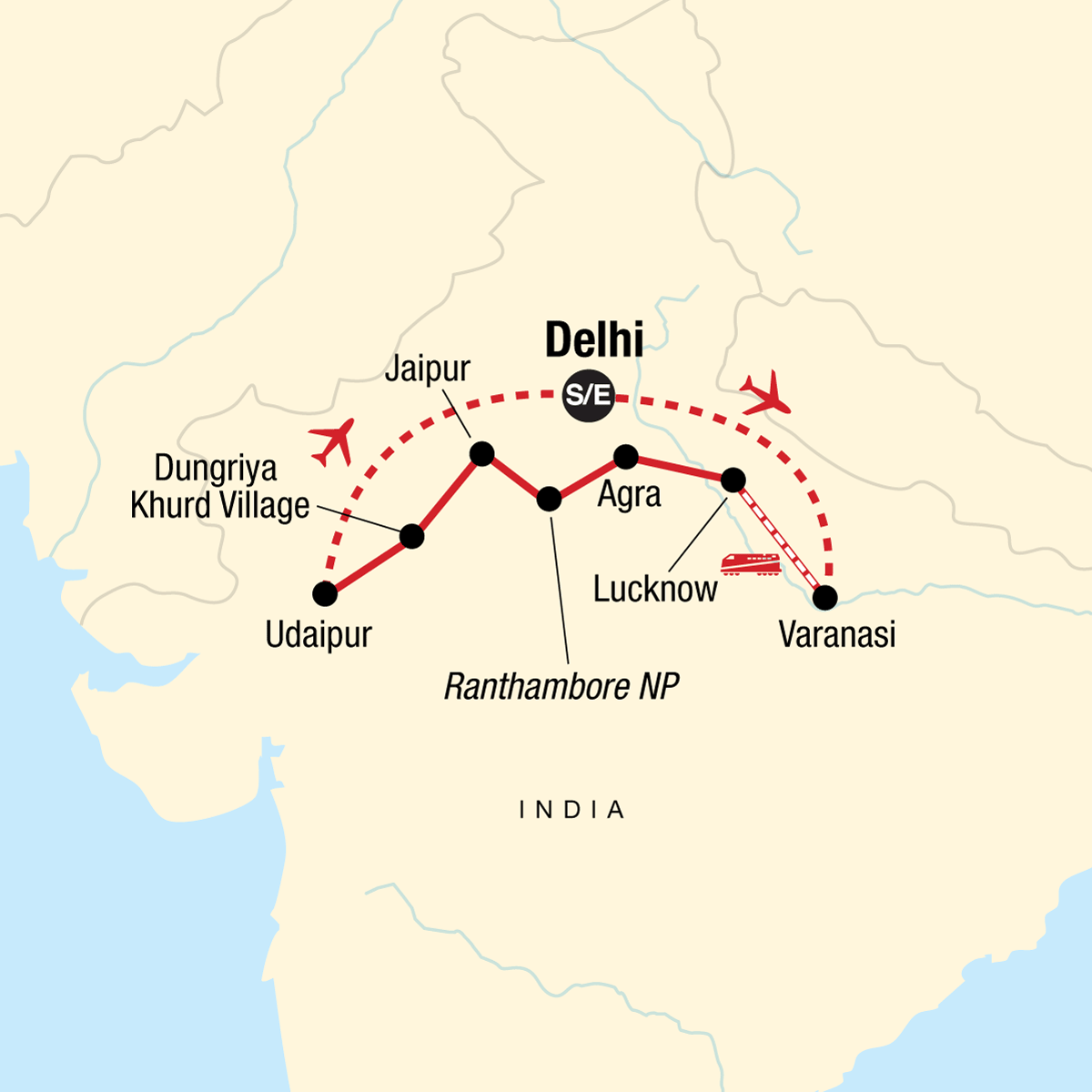14-Nights Discover India - National Geographic Journeys from $3,599
G Adventures
OFFER ID 1532824
Journeys: Discover India
Delve into northern India’s cultural riches on an unforgettable journey from Delhi to Varanasi, Agra to Jaipur, and beyond. Discover the world’s most magnificent monument to love, the Taj Mahal; learn about the spiritual significance of the Ganges River with a local scholar; and gain insights into rural life in a quaint Rajasthani village. Get a glimpse of a rarely seen side of Delhi alongside a youth guide from a G Adventures–supported project, and immerse yourself in the culinary heritage of Lucknow on a food tour.
Highlights
Walk the backstreets of Delhi with a local guide, enjoy a talk with a local historian and scholar, explore the grand forts and palaces in Rajasthan, enjoy a safari in Ranthambore National Park, experience village life near the holy town of Pushkar
Accommodation
Hotels (13 nts), cottage (1 nt).
Group Leader
CEO (Chief Experience Officer) throughout, local guides.
Group Size Notes
Max 16, Avg 12.
Meals Included
14 breakfasts, 5 dinners
What's Included
Your Journeys Highlight Moment: Ganges River Talk, Varanasi
Your Journeys Highlight Moment: Lucknow Local Food Walk, Lucknow
Your Journeys Highlight Moment: Family Culinary Experience, Jaipur
Your Journeys Highlight Moment: Doongariya khurd Village Experience, Pushkar
Your G for Good Moment: Women With Wheels Transfer, Indira Gandhi International Airport
Your G for Good Moment: City Walk, Delhi
Your G for Good Moment: Anoothi Block Printing Experience, Jaipur
Your Wellness Moment: Yoga Class, Udaipur. Rickshaw tour of Old Delhi. Orientation walk of Varanasi and Pushkar. Excursion to Sarnath. Sunset and sunrise boat trips on the Ganges River. Tour of Lucknow. Bara Imambara visit. Tour the Taj Mahal. Safari drive. Visit Ranthambore Fort and the Ganesh temple. Tour Jaipur and visit Amber Fort. Tour Udaipur. Internal flights. All transport between destinations and to/from included activities.

14 nights from $3,599 per person
Vacation Details
* This departure has been designated a guaranteed departure by the operator, meaning that the minimum number of guests has been met, although still subject to weather and other conditions.
Local Flights
All local flights are included in the cost of your tour unless otherwise noted. It is important that we have your passport information at the time of booking in order to process these tickets. Internal flight tickets are issued locally and will be given to you prior to the flight departure. Please Note: Only 1 piece of luggage that weighs up to 15kgs will be permitted on our internal flights in India. For any extra weight the airline may charge an additional fee at the time of check-in.
Dossier Disclaimer
The information in this trip details document has been compiled with care and is provided in good faith. However it is subject to change, and does not form part of the contract between the client and the operator. The itinerary featured is correct at time of printing. It may differ slightly to the one in the brochure. Occasionally our itineraries change as we make improvements that stem from past travellers, comments and our own research. Sometimes it can be a small change like adding an extra meal along the itinerary. Sometimes the change may result in us altering the tour for the coming year. Ultimately, our goal is to provide you with the most rewarding experience. Please note that our brochure is usually released in November each year. If you have booked from the previous brochure you may find there have been some changes to the itinerary. VERY IMPORTANT: Please ensure that you print a final copy of your Trip Details to review a couple of days prior to travel, in case there have been changes that affect your plans.
Itinerary Disclaimer
While it is our intention to adhere to the route described below, there is a certain amount of flexibility built into the itinerary and on occasion it may be necessary, or desirable to make alterations. The itinerary is brief, as we never know exactly where our journey will take us. Due to our style of travel and the regions we visit, travel can be unpredictable. The Trip Details document is a general guide to the tour and region and any mention of specific destinations or wildlife is by no means a guarantee that they will be visited or encountered. Aboard expedition trips visits to research stations depend on final permission. Additionally, any travel times listed are approximations only and subject to vary due to local circumstances.
All fares are quoted in US Dollars.
Reference this number when contacting our agency so we may better serve you. Also keeping this number handy will allow you to locate this document again quickly.
